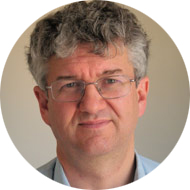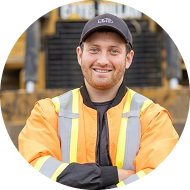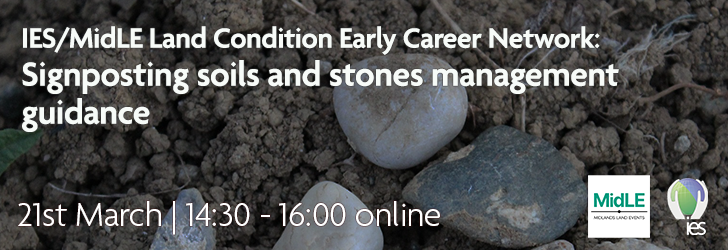Join us for our next Land Condition Early Career Network event organised in collaboration with Midlands Land Events (MidLE).
The importance of soils is becoming more widely recognised, with soils moving up the agenda for many stakeholders in the land condition sector. For people making decisions about soils at the project level it is vital that the changing legislative landscape and guidance is understood, to enable sound environmental decision making that is compliant.
This webinar will introduce key guidance and legislation related to soils:
- The 10 Principles of Good Soils and Stones Management (SocEnv)
- Code of practice for the sustainable use of soils on construction sites (DEFRA)
- Sustainable management of surplus soils and aggregates (CIRIA)
- The importance of tracking materials movements and an example of how materials tracking works – Canadian Case Study
This will provide attendees with the context for understanding how these documents can be used in practice and highlight the environmental benefits of complying with best practice guidance.
Our speakers
 Jonathan Atkinson: After 34 years in the Environment Agency and the Kent CC Waste reg team, Jonathan has recently moved to work with CL:AIRE, an industry leading organisation dealing with best practice guidance and frameworks for positive materials management on sustainable development sites, enabling land contamination issues to be dealt with comprehensively. He is also engaged with developing wider commitments to soil resources and management across all sectors and is involved with industry and professional body working groups on a variety of environmental issues.
Jonathan Atkinson: After 34 years in the Environment Agency and the Kent CC Waste reg team, Jonathan has recently moved to work with CL:AIRE, an industry leading organisation dealing with best practice guidance and frameworks for positive materials management on sustainable development sites, enabling land contamination issues to be dealt with comprehensively. He is also engaged with developing wider commitments to soil resources and management across all sectors and is involved with industry and professional body working groups on a variety of environmental issues.
He has worked on risk assessments for developed closed landfill sites, assessing landfill engineering and environmental controls on permitted sites, and enforcement activity where necessary, as well as reviewing a variety of land contamination projects through the planning process. In the EA he was part of a team of GW&CL specialists and an advisor on a number of specific projects related to soil remediation and waste management, including DoWCoP and emerging substances like PFAS.

Chris Berryman: With a strong geo-environmental background, Chris has 19 years of experience working in both the academic research and consultancy sectors. He is a Chartered Resource and Waste Manager, Chartered Environmentalist, Member of the British Society of Soil Science and Fellow of the Institute of Quarrying.
Chris leads a UK team in Environmental Permitting across all industry sectors and acts as project Director for a wide range of projects including waste Environmental Permitting and Compliance and the “designing out” of waste for major infrastructure and EIA schemes. Chris is Lead Author for major new CIRIA guidance (C809) which seeks to provide clear best practice guidance to the development sector on the use of soils and aggregates from construction (Berryman, C, Watkins, G, Crozier, F, Parsons, J (2023) Sustainable management of surplus soil and aggregates from construction, C809, CIRIA, London, UK (ISBN: 978-0-86017-953-5). He also is also a member of the Society for the Environment’s Regulatory Task Group which has developed a set of guiding principles relating to soil and aggregate reuse which aims to influence Government thinking as part of the Society’s ongoing Soil and Stones project. He is a Qualified Person (QP448) under the CL:AIRE Definition of Waste Code of Practice (DoW CoP) and an active participant on other industry forums and working including the Mineral Products Association (MPA) waste group and Environment Agency/DEFRA inert waste group. He has authored several prominent articles in the regulatory/legal sections of industry journals and is also an active public speaker at various industry and professional events.
 Kevin Goldberg: Kevin began his career working for a company handling liquid solidification on subway tunnel spoils. After experiencing the pain of handling disposal paperwork, the Western University environmental engineering grad began exploring a venture to solve this problem. In 2019, he and a
Kevin Goldberg: Kevin began his career working for a company handling liquid solidification on subway tunnel spoils. After experiencing the pain of handling disposal paperwork, the Western University environmental engineering grad began exploring a venture to solve this problem. In 2019, he and a
fellow engineer started SoilFLO, software that enables users to manage the movement of excess material across construction projects. Started in Ontario, the company has since expanded internationally, with customers in the United States, United Kingdom and Australia. The company and its crew of 13 has more than 130 customers in Canada, including three LRT subway projects in Ontario. A disruptor in the earthworks industry, five years ago, digital soil tracking was unheard of and project owners and environmental consultants had few ways of verifying the proper handling and disposal of excess material. Goldberg’s work has brought a new layer of environmental control to an industry that otherwise did not exist. Quarries and other various rehabilitation projects across Canada can now confidently import soil with a lower risk of contamination.


